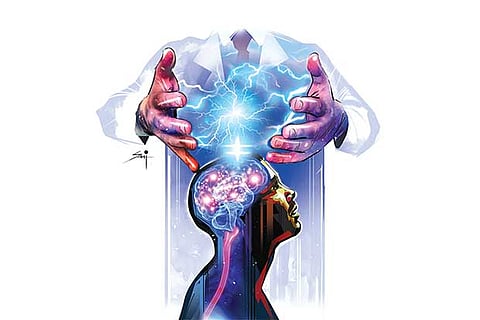

Chennai
There are an estimated 6,000 psychiatrists in India, about a tenth of whom are in Tamil Nadu. While this paints a rosy picture about the State’s situation in comparison, it is far from the truth: there are only less than 600 psychiatrists in Tamil Nadu against the demand for at least 2,500 to 3,000 for a population of more than seven crore.
“While the situation is much better in [states like] Tamil Nadu, Kerala, Karnataka and Maharashtra, it is still low,” said Dr Lakshmi Vijayakumar, founder of Sneha, an organisation that works in the area of suicide prevention.
Unlike all other streams of medicine, psychiatry carried a stigma in the society, which is largely responsible for the shortage that the country has been facing. “The subject has always received very little attention as mental illness is a cause for stigma. It is said that the situation is not as grave as it used to be a few of years ago,” said former director of Medical Education Dr V Kanagasabai.
The specialisation, which attracted very few students till around 20 years ago, is now witnessing a growing interest but the number of seats has not increased accordingly, added Dr Vijayakumar. “Only one per cent of all medical students are psychiatrists,” she pointed out.
Statistics reveal that there are only 40 seats for MD Psychiatry course in the state – 21 under State Quota and the rest under the All-India Quota. “The number of seats is not adequate considering the population requirement. Therefore, the state must take efforts to increase the number of seats in both government and private sector institutions,” said Dr Kanagasabai, concurring with the Sneha founder.
According to the former head of medical education in the State, the stigma against the stream of medicine continues to prevail. “Youngsters prefer taking up courses that will guarantee them more work, more money and practice. So they tend to opt for courses like Gynaecology, Orthopaedics, Oncology and the like, realising that the number of patients with psychiatric illnesses coming forward won’t be as much,” Kanagasabai added.
Making matters worse, even the limited number of professionals who pass out from the institutions here prefer to work abroad. “A large number of these specialists move abroad, which is one of the main reasons we see this shortage. According to the American Psychiatric Association, there are over 10,000 psychiatrists of Indian origin working in the United States,” pointed out Dr Lakshmi Vijayakumar, adding how the United Kingdom is another avenue for the young professionals from India. “When a shortage of psychiatrists was recorded in the UK, they came here and offered consultancy posts, which attracted many senior Indian doctors,” she recalled.
And then there is the trouble of unequal distribution of professionals across the State, due to which there are enough psychiatrists available in urban clusters like Chennai, while there are none in the rest of the areas. For instance, added Dr Vijayakumar, there are an estimated 200 psychiatrists in the capital city, but all the other 31 districts have only less than 400 professionals.
According to C Aravind, a college professor, while increasing the number of seats for psychiatry specialisation, it would still take some time before these students graduate and join the workforce. “What is most important is to train general practitioners and integrated community workers to identify mental illness issues and direct the patients to the right doctors so as to prevent them from seeking the help of quacks,” he said.
The shortage in the number of experts, he added, is not a new phenomenon. It was estimated years ago itself that the country had an alarming 77 per cent shortage in the number of psychiatrists when compared with the 2001 census. Seventeen States and Union Territories had even lesser number. “There is no great improvement that the country has seen since then,” he added.
Why do we need clinical psychologists?
Besides psychiatrists, the state has also been facing a serious shortage of clinical psychologists, due to which many institutions are hiring psychologists. “It is, however, not the same, as they are not qualified to deal with psychometric assessments, especially in legal cases,” said a source from the Institute of Mental Health, Chennai.
The job of a clinical psychologist includes meeting clients to identify their problems — emotional, mental and behavioural — and diagnose any existing or potential disorders, before referring them to psychiatrists (if required). A regular psychologist would find it challenging to replace them.
Psychology has a number of branches, some more attractive than clinical psychology in terms of pay and service. “Once a student completes MSc in Psychology, she has to decide which branch to focus on for MPhil. More often than not, students opt for Educational Psychology as it will allow them to work with students, or Human Resources that will open gates to them into large companies. Clinical psychology is therefore not the most preferred option,” added Dr Vijayakumar.
Due to this shortage, Chennai and other large cities receive many referrals from the districts. “We have 10 postgraduates and 8 diploma holders in our Institute, three each at the Government Kilpauk Medical College and Hospital, Government Stanley Medical College and Hospital, and Government Chengelpattu Medical College and Hospital,” added the source from IMH.
For students, clinical psychology is the last option as there are fewer patients, added Dr Kanagasabai. “The burden of mental health issues like anxiety, lack of tolerance and stress is increasing rapidly among the urban and rural populations, and will hence need more attention,” he cautioned.
Psychologist versus Psychiatrist
Visit news.dtnext.in to explore our interactive epaper!
Download the DT Next app for more exciting features!
Click here for iOS
Click here for Android